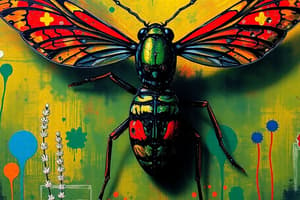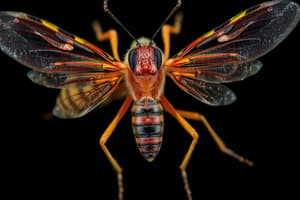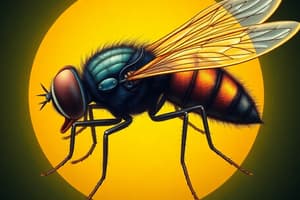Podcast
Questions and Answers
Forensic entomology is the interpretation of insect evidence used in an investigation.
Forensic entomology is the interpretation of insect evidence used in an investigation.
True (A)
Forensic entomology only recently began being used to solve investigations.
Forensic entomology only recently began being used to solve investigations.
False (B)
Active decay is the stage of decay in which the body is starting to dry out.
Active decay is the stage of decay in which the body is starting to dry out.
False (B)
Blowflies are among the first to arrive at a body and can be instrumental in determining PMI.
Blowflies are among the first to arrive at a body and can be instrumental in determining PMI.
Oviposition can occur at night and in the rain.
Oviposition can occur at night and in the rain.
Adult insects of the same species should be placed in the same jar when being collected as evidence.
Adult insects of the same species should be placed in the same jar when being collected as evidence.
Empty pupal cases should not be collected.
Empty pupal cases should not be collected.
Insect evidence can determine a victim's exposure to drugs or alcohol.
Insect evidence can determine a victim's exposure to drugs or alcohol.
Amplifying DNA by using PCR on the tissues maggots ingested is a way of identifying a victim.
Amplifying DNA by using PCR on the tissues maggots ingested is a way of identifying a victim.
Thin layer chromatography is being used to identify specific amino acids in insect eggs.
Thin layer chromatography is being used to identify specific amino acids in insect eggs.
Flashcards are hidden until you start studying
Study Notes
Forensic Entomology
- Forensic entomology involves the analysis of insect evidence and plays a critical role in investigations.
- The field has a longstanding history in criminal investigations, contrary to the belief that it is a recent development.
Stages of Decay
- Active decay is inaccurately defined as the stage where the body dries out; this stage involves significant decomposition and odor release.
Insect Behavior and Evidence Collection
- Blowflies are vital in forensic investigations, being the first insects to arrive at a body, aiding in the estimation of the post-mortem interval (PMI).
- Oviposition, the process of laying eggs, can occur in various conditions, including nighttime and rainy weather.
- It is crucial to collect adult insects of different species separately to avoid cross-contamination of evidence.
Importance of Pupal Cases
- Collecting empty pupal cases is essential in forensic entomology, as they can provide valuable information regarding the lifecycle of insects present at a crime scene.
Drug and Alcohol Exposure
- Insect evidence can reveal a victim's exposure to substances such as drugs or alcohol, enhancing the investigation's scope.
DNA Analysis
- Utilizing PCR (Polymerase Chain Reaction) on tissues ingested by maggots is an effective method for identifying victims based on genetic material.
Analytical Techniques
- Thin layer chromatography is not employed to identify specific amino acids in insect eggs, highlighting the need for accurate understandings of forensic methodologies.
Studying That Suits You
Use AI to generate personalized quizzes and flashcards to suit your learning preferences.



